Unit 12 What did you do last weekend? 单元语言知识点讲练 课件(新目标七年级下册)
文档属性
| 名称 | Unit 12 What did you do last weekend? 单元语言知识点讲练 课件(新目标七年级下册) |
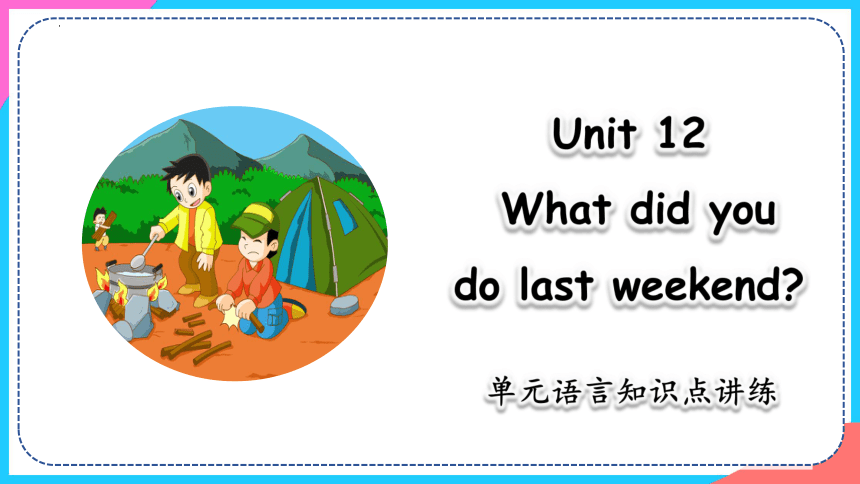
|
|
| 格式 | pptx | ||
| 文件大小 | 1.5MB | ||
| 资源类型 | 试卷 | ||
| 版本资源 | 人教新目标(Go for it)版 | ||
| 科目 | 英语 | ||
| 更新时间 | 2024-05-22 00:00:00 | ||
图片预览


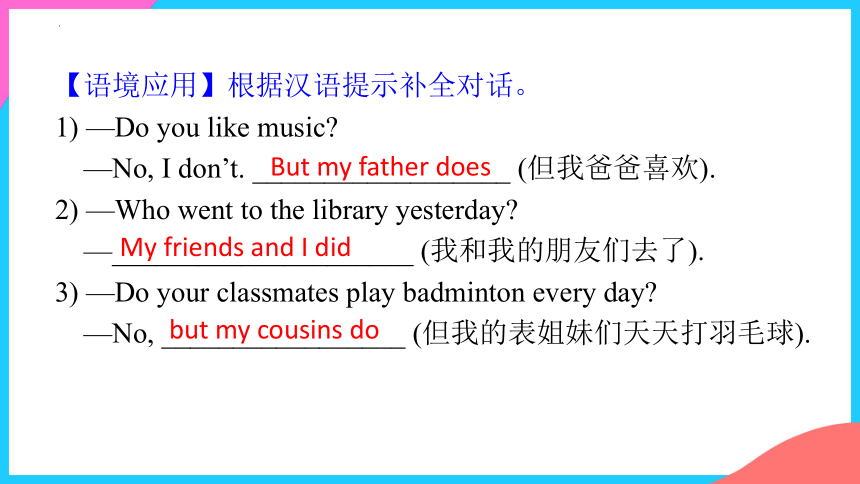
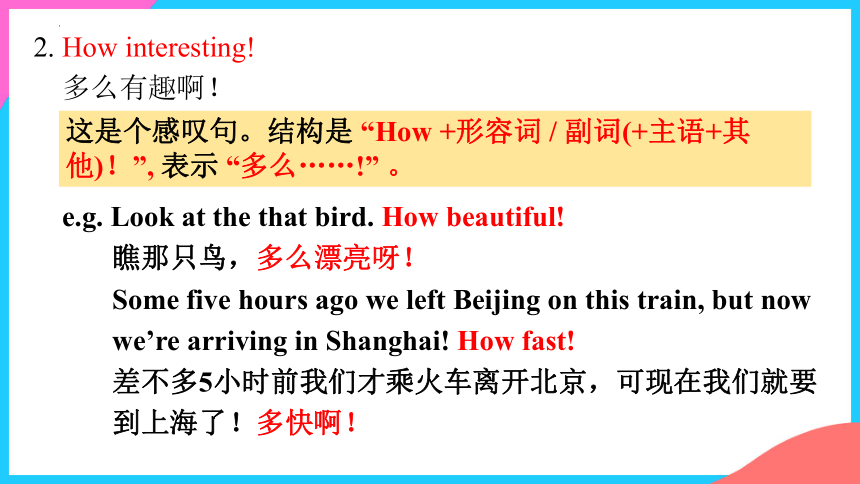
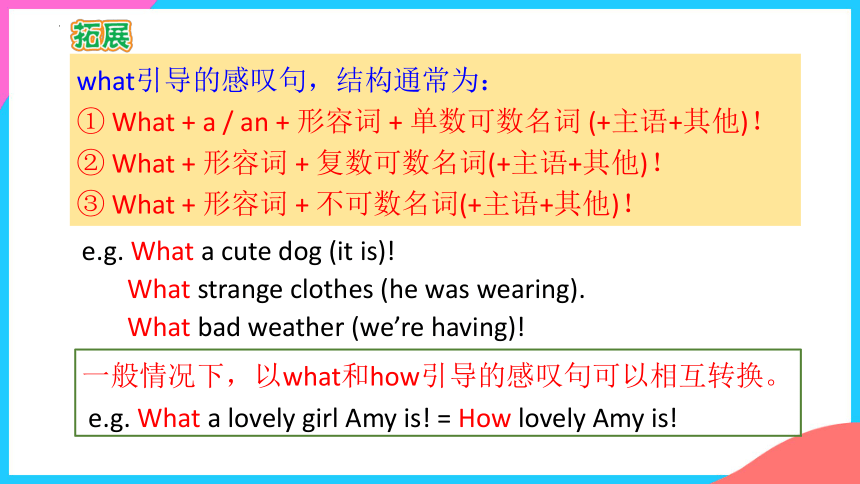
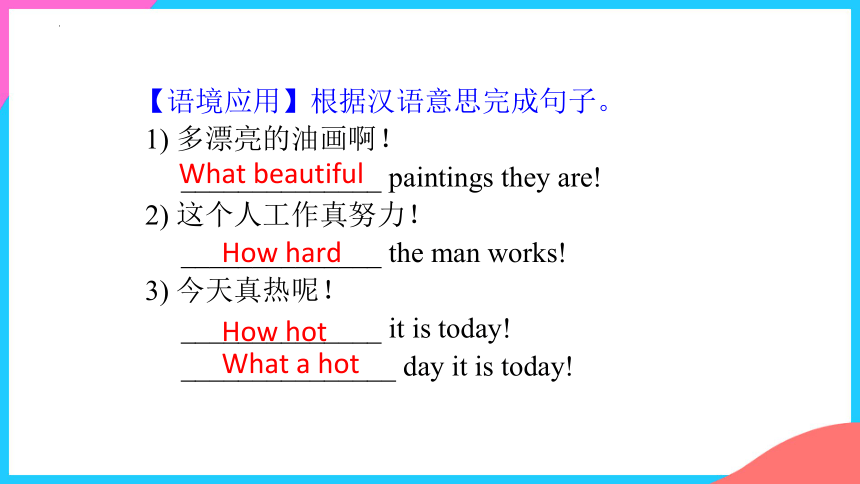
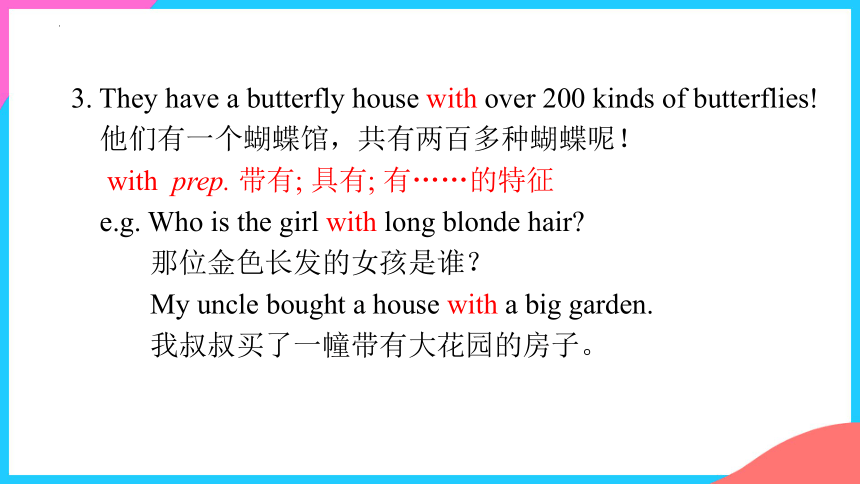

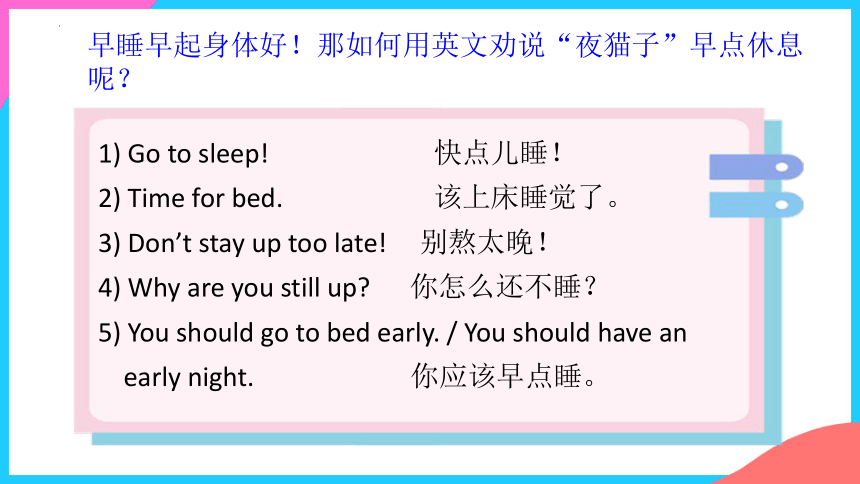

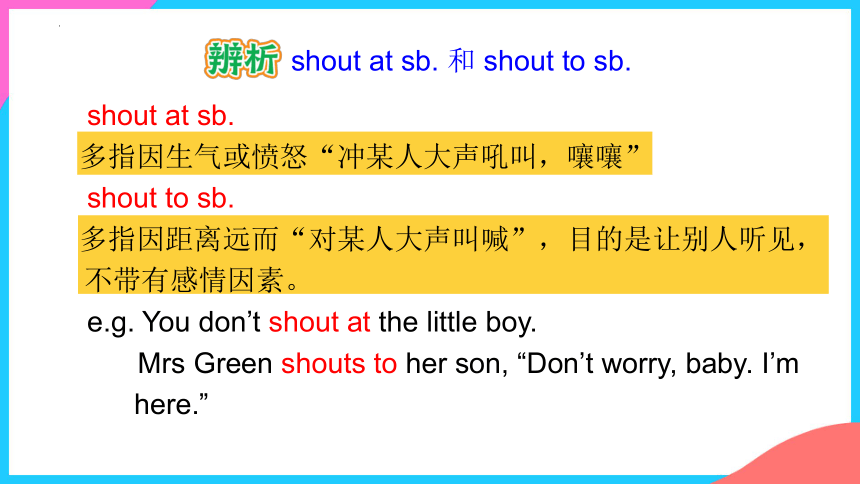
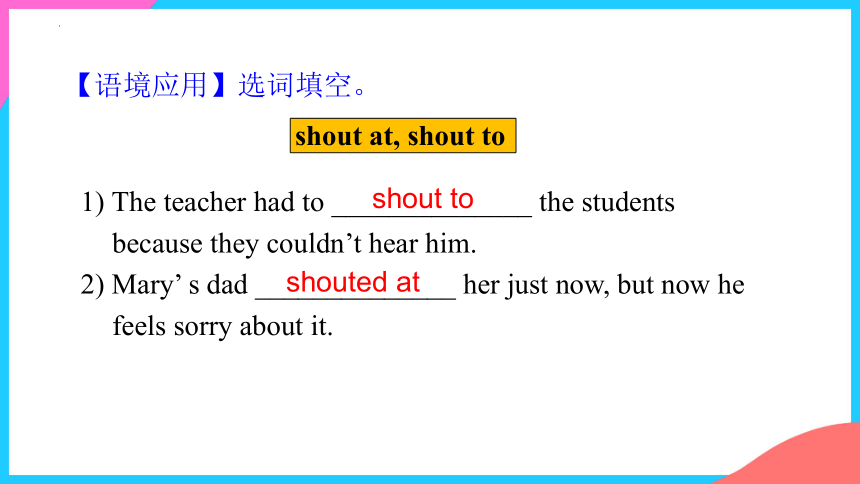
文档简介
(共44张PPT)
Unit 12
What did you do last weekend
单元语言知识点讲练
1. —Who visited her grandma 谁去看望她奶奶了?
—Becky did. Becky去了。
答语中的did代替前面问句中的visited her grandma。英语中为了避免重复,使用do, does, did等来代替前面的动词(短语),其形式与前面动词的时态以及后面主语的单复数保持一致。
e.g. —Who often studies English in the morning
—My brother does.
—Do you go to the cinema every Sunday
—No, but my parents do.
【语境应用】根据汉语提示补全对话。
1) —Do you like music
—No, I don’t. __________________ (但我爸爸喜欢).
2) —Who went to the library yesterday
—_____________________ (我和我的朋友们去了).
3) —Do your classmates play badminton every day
—No, _________________ (但我的表姐妹们天天打羽毛球).
But my father does
My friends and I did
but my cousins do
2. How interesting!
多么有趣啊!
e.g. Look at the that bird. How beautiful!
瞧那只鸟,多么漂亮呀!
Some five hours ago we left Beijing on this train, but now we’re arriving in Shanghai! How fast!
差不多5小时前我们才乘火车离开北京,可现在我们就要到上海了!多快啊!
这是个感叹句。结构是 “How +形容词 / 副词(+主语+其他)!”, 表示 “多么……!” 。
what引导的感叹句,结构通常为:
① What + a / an + 形容词 + 单数可数名词 (+主语+其他)!
② What + 形容词 + 复数可数名词(+主语+其他)!
③ What + 形容词 + 不可数名词(+主语+其他)!
e.g. What a cute dog (it is)!
What strange clothes (he was wearing).
What bad weather (we’re having)!
一般情况下,以what和how引导的感叹句可以相互转换。
e.g. What a lovely girl Amy is! = How lovely Amy is!
【语境应用】根据汉语意思完成句子。
1) 多漂亮的油画啊!
______________ paintings they are!
2) 这个人工作真努力!
______________ the man works!
3) 今天真热呢!
______________ it is today!
_______________ day it is today!
What beautiful
How hard
How hot
What a hot
3. They have a butterfly house with over 200 kinds of butterflies!
他们有一个蝴蝶馆,共有两百多种蝴蝶呢!
with prep. 带有; 具有; 有……的特征
e.g. Who is the girl with long blonde hair
那位金色长发的女孩是谁?
My uncle bought a house with a big garden.
我叔叔买了一幢带有大花园的房子。
4. I stayed up late to watch the soccer game.
我熬夜看足球赛了。
stay up (late) 深夜不睡;熬夜
e.g. Don’t stay up late. It’s bad for your health.
不要熬夜,这对你身体不好。
1) Go to sleep! 快点儿睡!
2) Time for bed. 该上床睡觉了。
3) Don’t stay up too late! 别熬太晚!
4) Why are you still up 你怎么还不睡?
5) You should go to bed early. / You should have an early night. 你应该早点睡。
早睡早起身体好!那如何用英文劝说“夜猫子”早点休息呢?
Father Mouse shouted at the cat, “Woof, woof!”
鼠爸爸冲着猫大声吼叫:“汪汪,汪汪!”
e.g. Don’t shout at that old man.
不要冲那位老人大喊大叫。
shout v. 呼叫;喊叫
shout at 冲……大声叫嚷
shout at sb.
多指因生气或愤怒“冲某人大声吼叫,嚷嚷”
shout to sb.
多指因距离远而“对某人大声叫喊”,目的是让别人听见,不带有感情因素。
e.g. You don’t shout at the little boy.
Mrs Green shouts to her son, “Don’t worry, baby. I’m here.”
shout at sb. 和 shout to sb.
shout at, shout to
1) The teacher had to ______________ the students because they couldn’t hear him.
2) Mary’ s dad ______________ her just now, but now he feels sorry about it.
【语境应用】选词填空。
shouted at
shout to
fly a kite 放风筝
1. fly - flew
① vt. 放飞
My father helped me to fly the model plane.
我的父亲帮助我操纵飞机模型。
② vi. 飞
fly to... 飞到…;乘飞机去…
This kind of birds flies to the south in winter.
这种鸟在冬天飞到南方。
fly a kite 放风筝
1. fly - flew
③ n[C]. 苍蝇
There are some flies flying in the room.
房间里有一些苍蝇在飞。
根据句意及提示,用恰当的短语填空。
1. Did you ____________ (放风筝) in the park
2. He often ____________________ (和朋友们一起吃晚饭) in that restaurant.
3. Look! John is __________________ (在游泳池里游泳).
4. Last Sunday afternoon Maria _______________ (为考试而学习) at home.
5. Two hours ago the Smiths ________________ (去图书馆).
fly a kite
has dinner with friends
swimming in a pool
studied for a test
went to the library
My sister finished high school two weeks ago.
2. 一段时间 + ago 多长时间之前
表达过去的时间,它常与一般过去时连用。
翻译:三天前,我们参观了自然历史博物馆。
We visited the Natural History Museum three days ago.
思考:ago和before有什么区别?
一段时间 + ago 多长时间之前(一定用于过去时)
before + 时间点 在某个时间点之前(不一定用于过去时)
I usually go to school before seven.
我通常七点以前上学。
before也可以单独用, 意为“以前”, 可用于一般过去时。
I didn’t know that before.
以前我不知道那件事情。
As a special gift, our parents took us to India.
3. take sb. to… 带领某人去某处
On Sundays, the father would take his son to the park.
一到星期天,爸爸便会带他的儿子去公园。
辨析:
bring 意为“拿来,带来”,表示拿到靠说话人近的地方。
take 意为“拿走,带走”,表示拿到远离说话人远的地
carry 意为“扛,搬”,用力移动,没有方向性
fetch 意为“去取,去拿”表示拿到了又返回。
The Young Pioneer ____ water for the old man every day.
A. fetches B. brings C. takes D. carries
First, we took a long bus ride to a lake in the countryside.
4. ride ① n[C]. 旅行,短途旅程;搭便车
Would you like to go for a ride 你想去兜风吗?
Could you give me a ride to school
你能给我搭个便车去学校吗?
go for a ride 去兜风
give sb. a ride 给某人搭便车
take a long bus ride 乘坐长途公交
4. ride - rode ② v. 骑( 马);乘坐
I learnt to ride a horse when I was a child.
当我是个孩子的时候就学骑马了。
ride a horse / bike 骑马、自行车
China has seen a trend(潮流) of ___ shared bikes since last year.
A. ride B. riding C. take D. taking
There we put up tents and made a fire to keep us warm and cook food on (it).
我们在那里搭帐篷、生火来使我们暖和起来,并在火上做饭。
put up tents 搭建帐篷
make a fire 生火
keep us warm 使得我们暖和
cook food on the fire 在火上做饭
There we put up tents and made a fire to keep us warm and cook food on (it).
我们在那里搭帐篷、生火来使我们暖和起来,并在火上做饭。
5. put up ① 搭建 ② 举起 ③ 张贴
put up a tent 搭建帐篷
put up sb’s hand 举起某人的手
put up a poster / notice 张贴海报 / 通知
put on 穿上,戴上
put off 脱下;推迟(a meeting)
put out 扑灭(fire)
put down 放下;镇压
—How was your trip in the mountains last weekend
—Fantastic. We even ______ a tent by the lake and lay in it.
A. put on B. put off C. put down D. put up
put的其他短语:
A primary school in England has _______ signs(指示牌) at its three entrances (入口), saying: Greet your child with a smile, not a mobile.
A. put into B. put off C. put on D. put up
I was so tired that I went to sleep early.
6. so + adj. / adv. + that... 如此…以至于…
He is so young that he can’t look after himself.
他如此小以至于不能照顾自己。
翻译:他如此忙以至于没有吃午饭。
He was so busy that he didn’t have lunch.
【辨析】 so that… / so…that
so + 形容词/副词 + that... 如此…以至于…(引导结果状语从句)
He runs so fast that nobody can catch up with him.
他跑得非常快,没人能追上他。
so that… 以便…,为了…(引导目的状语从句时)
I got up early so that I could catch the early bus.
我早起是为了搭乘早班车。
― _______ fine day it is today!
―Yes, the sunshine is _____ beautiful that I’d like to go swimming in the sea.
A. How, such B. What a, very
C. How, so D. What a, so
She bought a camera online ______ she would save a lot of time.
A. so that B. as soon as
C. no matter D. such that
We saw a big snake sleeping near the fire.
我们看见一条大蛇正在篝火附近睡觉。
My dad told me later that snakes…can feel things moving.
后来我爸告诉我蛇……能够感觉到东西的震动。
7. see / feel / hear sb. doing… 看见、觉得、听到某人正在做…
I can hear the children singing in the classroom.
我能听见孩子们在教室里唱歌。
When I passed the classroom, I saw a girl ______ in it.
A. sang B. sing C. danced D. dancing
—Is Tom in the next room
— Well, it’s hard to say. But I heard him ____ loudly when I passed by just now.
A. speak B. to speak
C. spoken D. speaking
My dad started to jump up and down in their tent.
8. start v. 开始,着手 = begin
start to do sth. = start doing sth. 开始做某事
= begin to do sth. = begin doing sth.
翻译:我五点半开始做作业的。
I started to do / doing my homework at 5:30.
start / begin with sth. 以某事开始
Let's start with easy things.
咱们从简单的事情开始。
start / begin sth. 创办某物
He started a newspaper.
他创办了一份报纸。
This woke the snake up and it moved into the forest
near the lake. 这样弄醒了蛇并且蛇移进了湖附近的森林里。
9. wake up 唤醒 (wake - woke)
When do you usually wake up
wake up sb. / wake sb. up
名词放后面或中间,代词放中间。
I always wake Mr. Green up/ wake up Mr. Green at 7:00.
Don’t speak so loud. You’ll wake them up.
The next morning, my sister and I got a terrible surprise.
10. surprise ① n. 惊奇,惊讶
What a nice surprise it is! 真是让人惊喜!
get a surprise 吃惊
give sb. a surprise 给某人一个惊喜
in surprise 惊讶地
to one's surprise 令某人惊讶的是
I got a surprise when I saw him.
当我看到他时我吃了一惊。
Bill looked at him in surprise.
比尔惊讶地看着他。
To his surprise, he passed the exam.
让他感到惊讶的是,他通过了考试。
The news surprised us. 这条消息使我们吃惊。
surprised adj. 感到惊讶的
surprising adj. 令人惊讶的
be surprised at sth. (人)对某事物感到惊讶
feel / be surprised to do sth. (人)做某事很惊讶
We are surprised at the surprising news.
我们对这则惊人的新闻感到惊讶。
10. surprise ② v. 使惊讶
令我们惊讶的是,吉姆在比赛结束前最后两分钟进了一个球。
____________________, Jim scored a goal in the last two minutes before the game was over.
To our surprise
My parents were very ________ at my ________ grades(分数) in the final exam.
A. surprised; surprised B. surprising; surprising
C. surprised; surprising D. surprising; surprised
When we looked out of our tent, we saw a big snake sleeping near the fire.
11. look out of… 向…外看
Please don’t look out of the window in class.
上课期间请不要往窗外看。
I’m looking into the house. 我正往房子里看。
look into… 往…看;调查
look out 当心、小心
—____! Something is falling down from the tall building.
—Dear me! It’s too dangerous.
A. Look out B. Help yourself
C. What a pity D. Shut up
小心
请自便
多么遗憾
住口,闭嘴
I was so scared that I couldn’t move.
12. scared adj. 惊慌的
She is scared of staying at home alone.
她不敢一个人待在家里。
be scared of sth. / doing sth. 害怕某物/做某事
be scared to do sth. 害怕做某事
翻译:汤姆害怕游泳。
Tom was scared of swimming. = Tom was scared to swim.
Don't scare the scared children by telling such scary stories.
别讲这么恐怖的故事吓唬害怕的孩子们。
We shouted to our parents to let them know about the danger.
13. let sb. do sth. 让某人做某事
let sb. not do sth. = don’t let sb. do sth. 不让某人做某事
Let him come here at once. 让他立刻到这儿来。
Let him not come in. = Don’t let him come in.
别让他进来。
make sb. do sth. 使某人做某事
We shouted to our parents to let them know about the danger.
13. let sb. do sth. 让某人做某事
make sb. do sth. 使某人做某事
What makes you think I’m a farmer
是什么使你认为我是一个农民?
Unit 12
What did you do last weekend
单元语言知识点讲练
1. —Who visited her grandma 谁去看望她奶奶了?
—Becky did. Becky去了。
答语中的did代替前面问句中的visited her grandma。英语中为了避免重复,使用do, does, did等来代替前面的动词(短语),其形式与前面动词的时态以及后面主语的单复数保持一致。
e.g. —Who often studies English in the morning
—My brother does.
—Do you go to the cinema every Sunday
—No, but my parents do.
【语境应用】根据汉语提示补全对话。
1) —Do you like music
—No, I don’t. __________________ (但我爸爸喜欢).
2) —Who went to the library yesterday
—_____________________ (我和我的朋友们去了).
3) —Do your classmates play badminton every day
—No, _________________ (但我的表姐妹们天天打羽毛球).
But my father does
My friends and I did
but my cousins do
2. How interesting!
多么有趣啊!
e.g. Look at the that bird. How beautiful!
瞧那只鸟,多么漂亮呀!
Some five hours ago we left Beijing on this train, but now we’re arriving in Shanghai! How fast!
差不多5小时前我们才乘火车离开北京,可现在我们就要到上海了!多快啊!
这是个感叹句。结构是 “How +形容词 / 副词(+主语+其他)!”, 表示 “多么……!” 。
what引导的感叹句,结构通常为:
① What + a / an + 形容词 + 单数可数名词 (+主语+其他)!
② What + 形容词 + 复数可数名词(+主语+其他)!
③ What + 形容词 + 不可数名词(+主语+其他)!
e.g. What a cute dog (it is)!
What strange clothes (he was wearing).
What bad weather (we’re having)!
一般情况下,以what和how引导的感叹句可以相互转换。
e.g. What a lovely girl Amy is! = How lovely Amy is!
【语境应用】根据汉语意思完成句子。
1) 多漂亮的油画啊!
______________ paintings they are!
2) 这个人工作真努力!
______________ the man works!
3) 今天真热呢!
______________ it is today!
_______________ day it is today!
What beautiful
How hard
How hot
What a hot
3. They have a butterfly house with over 200 kinds of butterflies!
他们有一个蝴蝶馆,共有两百多种蝴蝶呢!
with prep. 带有; 具有; 有……的特征
e.g. Who is the girl with long blonde hair
那位金色长发的女孩是谁?
My uncle bought a house with a big garden.
我叔叔买了一幢带有大花园的房子。
4. I stayed up late to watch the soccer game.
我熬夜看足球赛了。
stay up (late) 深夜不睡;熬夜
e.g. Don’t stay up late. It’s bad for your health.
不要熬夜,这对你身体不好。
1) Go to sleep! 快点儿睡!
2) Time for bed. 该上床睡觉了。
3) Don’t stay up too late! 别熬太晚!
4) Why are you still up 你怎么还不睡?
5) You should go to bed early. / You should have an early night. 你应该早点睡。
早睡早起身体好!那如何用英文劝说“夜猫子”早点休息呢?
Father Mouse shouted at the cat, “Woof, woof!”
鼠爸爸冲着猫大声吼叫:“汪汪,汪汪!”
e.g. Don’t shout at that old man.
不要冲那位老人大喊大叫。
shout v. 呼叫;喊叫
shout at 冲……大声叫嚷
shout at sb.
多指因生气或愤怒“冲某人大声吼叫,嚷嚷”
shout to sb.
多指因距离远而“对某人大声叫喊”,目的是让别人听见,不带有感情因素。
e.g. You don’t shout at the little boy.
Mrs Green shouts to her son, “Don’t worry, baby. I’m here.”
shout at sb. 和 shout to sb.
shout at, shout to
1) The teacher had to ______________ the students because they couldn’t hear him.
2) Mary’ s dad ______________ her just now, but now he feels sorry about it.
【语境应用】选词填空。
shouted at
shout to
fly a kite 放风筝
1. fly - flew
① vt. 放飞
My father helped me to fly the model plane.
我的父亲帮助我操纵飞机模型。
② vi. 飞
fly to... 飞到…;乘飞机去…
This kind of birds flies to the south in winter.
这种鸟在冬天飞到南方。
fly a kite 放风筝
1. fly - flew
③ n[C]. 苍蝇
There are some flies flying in the room.
房间里有一些苍蝇在飞。
根据句意及提示,用恰当的短语填空。
1. Did you ____________ (放风筝) in the park
2. He often ____________________ (和朋友们一起吃晚饭) in that restaurant.
3. Look! John is __________________ (在游泳池里游泳).
4. Last Sunday afternoon Maria _______________ (为考试而学习) at home.
5. Two hours ago the Smiths ________________ (去图书馆).
fly a kite
has dinner with friends
swimming in a pool
studied for a test
went to the library
My sister finished high school two weeks ago.
2. 一段时间 + ago 多长时间之前
表达过去的时间,它常与一般过去时连用。
翻译:三天前,我们参观了自然历史博物馆。
We visited the Natural History Museum three days ago.
思考:ago和before有什么区别?
一段时间 + ago 多长时间之前(一定用于过去时)
before + 时间点 在某个时间点之前(不一定用于过去时)
I usually go to school before seven.
我通常七点以前上学。
before也可以单独用, 意为“以前”, 可用于一般过去时。
I didn’t know that before.
以前我不知道那件事情。
As a special gift, our parents took us to India.
3. take sb. to… 带领某人去某处
On Sundays, the father would take his son to the park.
一到星期天,爸爸便会带他的儿子去公园。
辨析:
bring 意为“拿来,带来”,表示拿到靠说话人近的地方。
take 意为“拿走,带走”,表示拿到远离说话人远的地
carry 意为“扛,搬”,用力移动,没有方向性
fetch 意为“去取,去拿”表示拿到了又返回。
The Young Pioneer ____ water for the old man every day.
A. fetches B. brings C. takes D. carries
First, we took a long bus ride to a lake in the countryside.
4. ride ① n[C]. 旅行,短途旅程;搭便车
Would you like to go for a ride 你想去兜风吗?
Could you give me a ride to school
你能给我搭个便车去学校吗?
go for a ride 去兜风
give sb. a ride 给某人搭便车
take a long bus ride 乘坐长途公交
4. ride - rode ② v. 骑( 马);乘坐
I learnt to ride a horse when I was a child.
当我是个孩子的时候就学骑马了。
ride a horse / bike 骑马、自行车
China has seen a trend(潮流) of ___ shared bikes since last year.
A. ride B. riding C. take D. taking
There we put up tents and made a fire to keep us warm and cook food on (it).
我们在那里搭帐篷、生火来使我们暖和起来,并在火上做饭。
put up tents 搭建帐篷
make a fire 生火
keep us warm 使得我们暖和
cook food on the fire 在火上做饭
There we put up tents and made a fire to keep us warm and cook food on (it).
我们在那里搭帐篷、生火来使我们暖和起来,并在火上做饭。
5. put up ① 搭建 ② 举起 ③ 张贴
put up a tent 搭建帐篷
put up sb’s hand 举起某人的手
put up a poster / notice 张贴海报 / 通知
put on 穿上,戴上
put off 脱下;推迟(a meeting)
put out 扑灭(fire)
put down 放下;镇压
—How was your trip in the mountains last weekend
—Fantastic. We even ______ a tent by the lake and lay in it.
A. put on B. put off C. put down D. put up
put的其他短语:
A primary school in England has _______ signs(指示牌) at its three entrances (入口), saying: Greet your child with a smile, not a mobile.
A. put into B. put off C. put on D. put up
I was so tired that I went to sleep early.
6. so + adj. / adv. + that... 如此…以至于…
He is so young that he can’t look after himself.
他如此小以至于不能照顾自己。
翻译:他如此忙以至于没有吃午饭。
He was so busy that he didn’t have lunch.
【辨析】 so that… / so…that
so + 形容词/副词 + that... 如此…以至于…(引导结果状语从句)
He runs so fast that nobody can catch up with him.
他跑得非常快,没人能追上他。
so that… 以便…,为了…(引导目的状语从句时)
I got up early so that I could catch the early bus.
我早起是为了搭乘早班车。
― _______ fine day it is today!
―Yes, the sunshine is _____ beautiful that I’d like to go swimming in the sea.
A. How, such B. What a, very
C. How, so D. What a, so
She bought a camera online ______ she would save a lot of time.
A. so that B. as soon as
C. no matter D. such that
We saw a big snake sleeping near the fire.
我们看见一条大蛇正在篝火附近睡觉。
My dad told me later that snakes…can feel things moving.
后来我爸告诉我蛇……能够感觉到东西的震动。
7. see / feel / hear sb. doing… 看见、觉得、听到某人正在做…
I can hear the children singing in the classroom.
我能听见孩子们在教室里唱歌。
When I passed the classroom, I saw a girl ______ in it.
A. sang B. sing C. danced D. dancing
—Is Tom in the next room
— Well, it’s hard to say. But I heard him ____ loudly when I passed by just now.
A. speak B. to speak
C. spoken D. speaking
My dad started to jump up and down in their tent.
8. start v. 开始,着手 = begin
start to do sth. = start doing sth. 开始做某事
= begin to do sth. = begin doing sth.
翻译:我五点半开始做作业的。
I started to do / doing my homework at 5:30.
start / begin with sth. 以某事开始
Let's start with easy things.
咱们从简单的事情开始。
start / begin sth. 创办某物
He started a newspaper.
他创办了一份报纸。
This woke the snake up and it moved into the forest
near the lake. 这样弄醒了蛇并且蛇移进了湖附近的森林里。
9. wake up 唤醒 (wake - woke)
When do you usually wake up
wake up sb. / wake sb. up
名词放后面或中间,代词放中间。
I always wake Mr. Green up/ wake up Mr. Green at 7:00.
Don’t speak so loud. You’ll wake them up.
The next morning, my sister and I got a terrible surprise.
10. surprise ① n. 惊奇,惊讶
What a nice surprise it is! 真是让人惊喜!
get a surprise 吃惊
give sb. a surprise 给某人一个惊喜
in surprise 惊讶地
to one's surprise 令某人惊讶的是
I got a surprise when I saw him.
当我看到他时我吃了一惊。
Bill looked at him in surprise.
比尔惊讶地看着他。
To his surprise, he passed the exam.
让他感到惊讶的是,他通过了考试。
The news surprised us. 这条消息使我们吃惊。
surprised adj. 感到惊讶的
surprising adj. 令人惊讶的
be surprised at sth. (人)对某事物感到惊讶
feel / be surprised to do sth. (人)做某事很惊讶
We are surprised at the surprising news.
我们对这则惊人的新闻感到惊讶。
10. surprise ② v. 使惊讶
令我们惊讶的是,吉姆在比赛结束前最后两分钟进了一个球。
____________________, Jim scored a goal in the last two minutes before the game was over.
To our surprise
My parents were very ________ at my ________ grades(分数) in the final exam.
A. surprised; surprised B. surprising; surprising
C. surprised; surprising D. surprising; surprised
When we looked out of our tent, we saw a big snake sleeping near the fire.
11. look out of… 向…外看
Please don’t look out of the window in class.
上课期间请不要往窗外看。
I’m looking into the house. 我正往房子里看。
look into… 往…看;调查
look out 当心、小心
—____! Something is falling down from the tall building.
—Dear me! It’s too dangerous.
A. Look out B. Help yourself
C. What a pity D. Shut up
小心
请自便
多么遗憾
住口,闭嘴
I was so scared that I couldn’t move.
12. scared adj. 惊慌的
She is scared of staying at home alone.
她不敢一个人待在家里。
be scared of sth. / doing sth. 害怕某物/做某事
be scared to do sth. 害怕做某事
翻译:汤姆害怕游泳。
Tom was scared of swimming. = Tom was scared to swim.
Don't scare the scared children by telling such scary stories.
别讲这么恐怖的故事吓唬害怕的孩子们。
We shouted to our parents to let them know about the danger.
13. let sb. do sth. 让某人做某事
let sb. not do sth. = don’t let sb. do sth. 不让某人做某事
Let him come here at once. 让他立刻到这儿来。
Let him not come in. = Don’t let him come in.
别让他进来。
make sb. do sth. 使某人做某事
We shouted to our parents to let them know about the danger.
13. let sb. do sth. 让某人做某事
make sb. do sth. 使某人做某事
What makes you think I’m a farmer
是什么使你认为我是一个农民?
同课章节目录
- Unit 1 Can you play the guitar?
- Section A
- Section B
- Unit 2 What time do you go to school?
- Section A
- Section B
- Unit 3 How do you get to school?
- Section A
- Section B
- Unit 4 Don't eat in class.
- Section A
- Section B
- Unit 5 Why do you like pandas?
- Section A
- Section B
- Unit 6 I'm watching TV.
- Section A
- Section B
- Review of Units 1-6
- Unit 7 It's raining!
- Section A
- Section B
- Unit 8 Is there a post office near here?
- Section A
- Section B
- Unit 9 What does he look like?
- Section A
- Section B
- Unit 10 I'd like some noodles.
- Section A
- Section B
- Unit 11 How was your school trip?
- Section A
- Section B
- Unit 12 What did you do last weekend?
- Section A
- Section B
